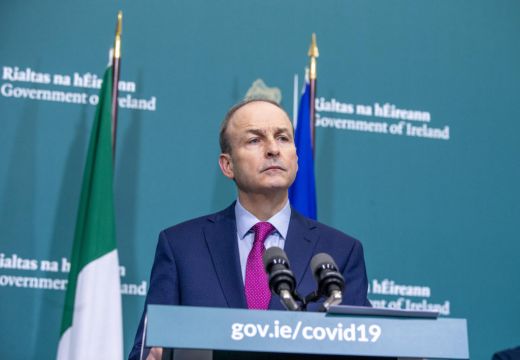Ireland will receive 46,500 extra doses of the Pfizer-BioNTech vaccine as part of a new deal secured by the European Union, Taoiseach Micheál Martin has confirmed.
The EU Commission announced a deal that will see four million extra Pfizer-BioNTech vaccines delivered to EU countries on Wednesday.
The Taoiseach tweeted: "Pleased this morning to have confirmation from Commission President @vonderleyen that Ireland will secure an additional 46,500 Pfizer BioNTech vaccines before the end of March. When they get here, they will be administered quickly. Efforts ongoing to increase production."
Pleased this morning to have confirmation from Commission President @vonderleyen that Ireland will secure an additional 46,500 Pfizer BioNTech vaccines before the end of March. When they get here, they will be administered quickly. Efforts ongoing to increase production.
— Micheál Martin (@MichealMartinTD) March 10, 2021
The doses will be distributed to member states according to their population size.
Commission president Ursula von der Leyen said: “I’m happy to announce today an agreement with BioNTech-Pfizer, who will offer to Member States to make available a total of four million doses of vaccines before the end of March, which will be supplied in addition to the planned dose deliveries.
“This will help Member States in their efforts to keep the spread of new variants under control.”
The Commission issued a statement which said the extra doses were possible as “a result of the successful expansion of manufacturing capacities in Europe, which was completed by mid-February”.
Meanwhile, the Government has made unsuccessful attempts to source extra Covid-19 vaccines from other countries in the European Union and the UK, however a spokesman said there are no plans to look for extra vaccines outside the EU.
Vaccine supply
The Irish Times reports that the Government also attempted to convince pharma companies Pfizer and Merck to manufacture vaccines in Ireland to boost supply.
However, the offer to assist in the costs of reconfiguring plants in Cork and Carlow to produce vaccines was unsuccessful.
“Ireland is trying everything it can,” said a Coalition spokesman. “There have been discussions with pharmaceutical firms, there’s been discussions with other countries. For instance, we were looking at the redistribution of unused vaccines within the EU. But they don’t exist because every member state needs their supplies . . . People have asked the UK. The British prime minister made it clear that they need all their supplies.”







